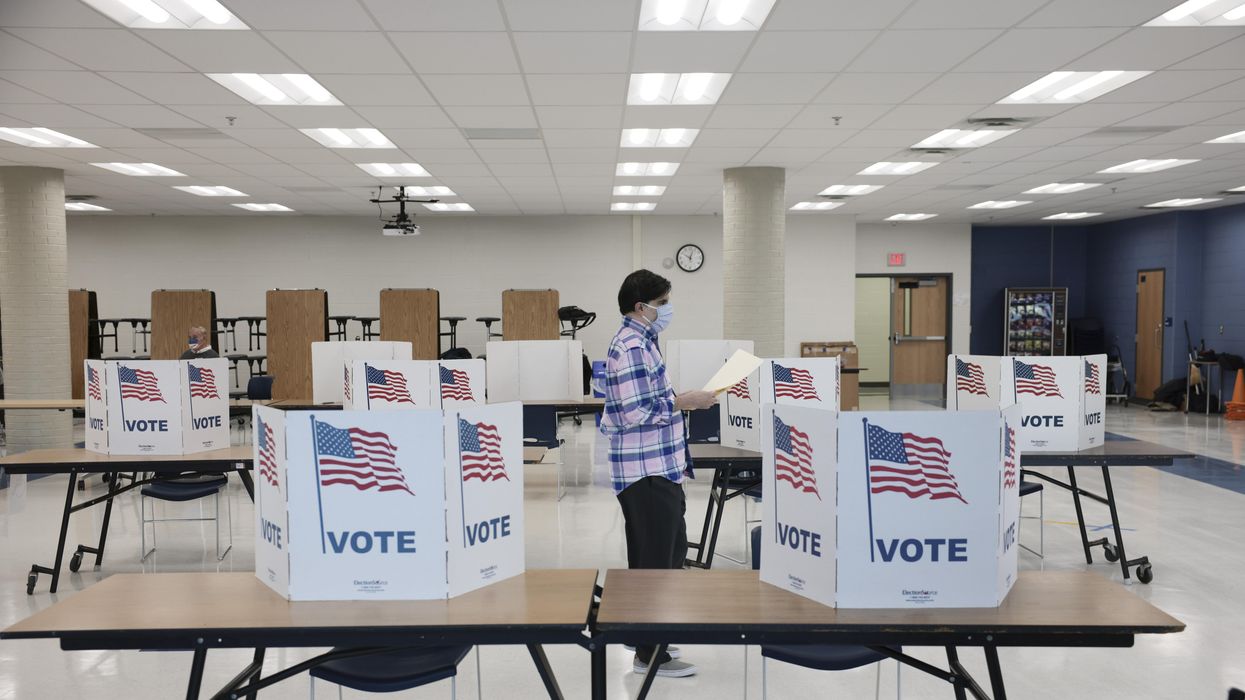Wilson is an associate professor of political science at the University of Indianapolis and a public voices fellow at The OpEd Project.
Senate action on voting legislation is stalled in 2021, even though governors across the country urged the U.S. Senate to pass the Freedom to Vote Act and the John R. Lewis Voting Rights Advancement Act. This postponement came at a time when voting rights are under siege in many cities and states, potentially blocking many who can vote from voting at all.
In a recent interview with CBS’ “Face The Nation,” Vice President Kamala Harris said, “And right now, we're about to take ourselves off the map as a role model, if we let people destroy one of the most important pillars of a democracy, which is free and fair elections.”
Recently New York City activists worked to give noncitizens the right to vote in local elections while Massachusetts is considering same-day voter registration. Meanwhile, the Justice Department recently announced its lawsuit against the state of Texas for violations of the Voting Rights Act of 1965.
National questions involving voting seem more politicized and polarized.
The voting rights bill, named in memory of the late civil rights leader and long-serving representative from Georgia, proposes many reforms including requiring federal preclearance in changing certain electoral districts, limiting restrictive voter ID requirements, and adding requirements to changing voter roll maintenance or voting locations.
Ballot access has become a highly politicized topic in our country. Changing the rules of voting will inevitably influence changes in behavior. But just making it easier to vote does not mean people will be incentivized to do so. Perhaps getting younger Americans involved in the process will improve voting rates.
Previous legislation has made small improvements. The Help America Vote Act of 2002, the National Voter Registration Act of 1993, and the Voter Registration Act of 1965 marked increases, but none have ushered in a substantial wave of higher voter turnout.
To encourage people to vote, the voters themselves actually need to want to do so. Research demonstrates that early learning experiences as well as trust and understanding of the electoral system lead to greater voter interest. In this arena, the U.S. as a democracy falls behind other countries.
In the United States, voter turnout averages 55 percent to 60 percent in presidential election years and the numbers are far lower in off-year election cycles ( 53.4 percent in 2018 and 41.9 percent in 2014).
Interestingly, 2020 marked a record high, with 67 percent of voting-age-eligible citizens voting, according to the Census Bureau. While this increase warrants recognition, the reality is that it is still well below many democracies globally. Turkey and Sweden rank among the highest in voter turnout with 88.9 percent and 82 percent, while Switzerland (36 percent) and Luxembourg (48 percent) are among the lowest.
Other countries can boast of higher voter turnout but that may be a result of their institutional structures that incentivize or require it. Data from the International Institute for Democracy and Electoral Assistance shows 27 countries practice compulsory.
Even then, voter turnout reveals a decline in voter turnout in all countries over the last 70 years, though the numbers are still higher in those states that require voting compared to those that do not. More democracies hold elections on weekends or even declare them to be holidays, giving many workers the day off with plenty of time to cast their ballots.
And this is where the United States needs to step up, Vice President Harris said in the CBS interview: "I believe that voting rights is one of the most significant issues that is facing us as individuals and as leaders today, there's no question, no question. Voting rights lead to every other right, every other right. And so we need to prioritize it as a nation, all of us and understand why voting rights are important and- and- and insist that our elected leaders preserve these rights."
One way to get more voter involvement is getting students working the polls. Forty-five states have youth poll worker programs that allow adolescents as young as 15 to work directly in elections.
For example, Indiana offers the Hoosier Hall Pass Program through the secretary of state’s office, enabling 16- and 17-year-olds to serve as registered poll workers in elections.
Though this program has existed for nearly two decades, many students and school districts are not taking advantage of this unique opportunity to participate directly in democracy. In Indianapolis and Marion County, the state’s capital and largest urban area, 150 students served among the 4,000 poll workers employed during the general election.
Poll workers tend to be older; a Pew Research survey found a majority of poll workers are over 60 years old. This was especially concerning during the Covid-19 pandemic. Voter registration efforts, like Big-Ten-leading Purdue University, can likewise encourage participation among younger voters.
When the U.S. Constitution was ratified in 1788, only white men who owned property qualified to cast a ballot. Since then, numerous amendments and laws have enabled more Americans to participate, breaking down barriers of race, sex, ethnic ancestry, property ownership and age.
The requirements to vote now are fairly simple and straightforward: You must be an American citizen, at least 18 years old, and fulfill your state’s residency and registration requirements. In most states, you cannot be serving a felony conviction, but in Maine, Vermont, and Washington, D.C., felons never lose their right to vote.
The American election system would benefit from a serious reevaluation of the mechanisms that exist and the effects they have. Voting is so much more than an annual task, and empowering “pre-voters” through experiential learning can impart that sense of civic virtue that is necessary for a healthy democracy.
Perhaps then more Americans who can vote actually will vote.



















